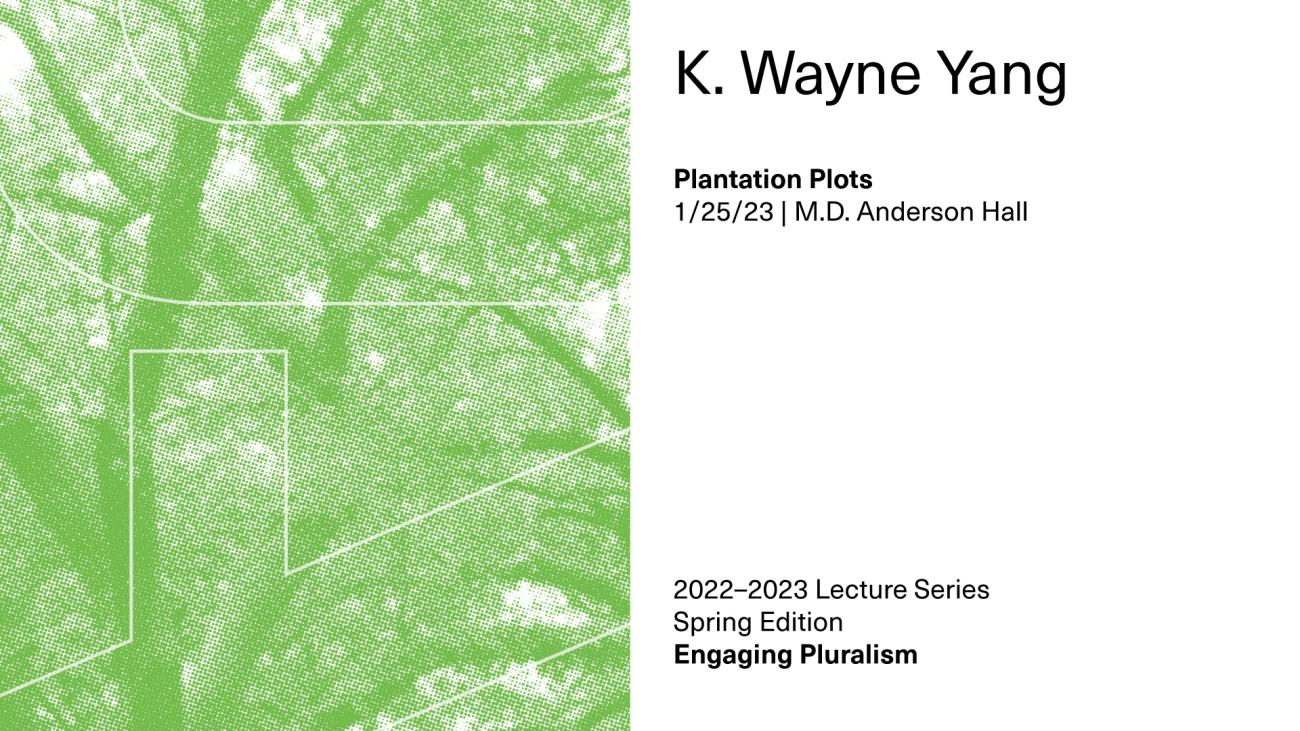Plantation Plots: What are our Decolonizing Designs?
The plantation is both architecture and the story we tell about it—place and plot. Sylvia Wynter describes the plantation as the master design for race and socioeconomics for the Americas. However, “plot” for Wynter also refers to the tiny piece of land allocated to Black people on the plantation. There-in Black people cultivated not only survival, but also epistemologies and connections to land, joy, love, and resistance. In the plot, Katherine McKittrick provocatively suggests, the plantation bears a Black future. This talk will build upon offerings by Black feminist architects and writers, to consider decolonizing designs across multiple meanings of the word “plot”: the narrative arc of a story, a plot of land, a conspiracy, and an architectural plan. K. Wayne Yang will touch on examples such as the Indigenous Futures Institute, Earthseed Laboratories, and the Land Relationships Super Collective. Attendees will be invited to converse about our own plots / decolonizing designs.
K. Wayne Yang writes about decolonization and everyday epic organizing, particularly from underneath ghetto colonialism, often with his frequent collaborator, Eve Tuck, and sometimes for an avatar called la paperson.
For e-flux Architecture, he wrote “Sustainability as Plantation Logic, Or, Who Plots an Architecture of Freedom?” Writings by la paperson include, A Third University is Possible, which is discussed in “How long is never?” an interview with Shoghig Halajian in Georgia, and in the Journal of Architectural Education, “This is a Beautiful World” with Jay Cephas, Igor Marjanović, & Ana Miljački.
Currently, he and Eve Tuck are convening the Land Relationships Super Collective with several Indigenous and non-Indigenous community organizations engaged in land-based projects. He is also Provost of Muir College and Professor in ethnic studies at UC San Diego, where he co-founded the Indigenous Futures Institute and Black Like Water.
Join the lecture live on our YouTube channel.
Engaging Pluralism
When ideologies and cultures collide, new ways of working with and living in the world emerge. As a form of political philosophy, pluralism draws upon this dynamic condition, promoting the coexistence of multiple approaches and worldviews. Yet in the context of compounding crises and unchecked inequality, this is far from a neutral position: it becomes a commitment to struggle and discourse. Drawing from a broad-ranging group of speakers, Rice Architecture’s annual lecture series, Engaging Pluralism, explores how architects and designers can work with friction, contradiction, and multiplicity to effect broader social, cultural, and environmental change. It is an all-school platform for reflecting on the possibilities and challenges of designing for a pluralistic society.
All lectures are free and open to the public and, unless noted otherwise, will be held in person in Farish Gallery, MD Anderson Hall, with a livestream component. In the event that COVID-19 circumstances prohibit in-person lectures, the series will be held virtually via Zoom. Each lecture has been submitted for AIA CES approval.
This lecture series is made possible through the generous support of the Betty R. and George F. Pierce Jr., FAIA, Fund; the William B. Coleman Jr. Colloquium Fund for Architecture; and the Wm. W. Caudill Lecture Series Fund. Rice Design Alliance (RDA) programming is made possible by the generous support of its members and underwriters: Harvey | Harvey Cleary, Lovett/Inwood Homes, Page, Anslow Bryant Construction, Elliott Electric/Eaton, Gensler, KenMor Electric Co., MAREK, Scott and Judy Nyquist, Tellepsen, Turner Construction Company, Walter P Moore, Wholesale Electric | ABB, and W.S. Bellows Construction Corporation.


